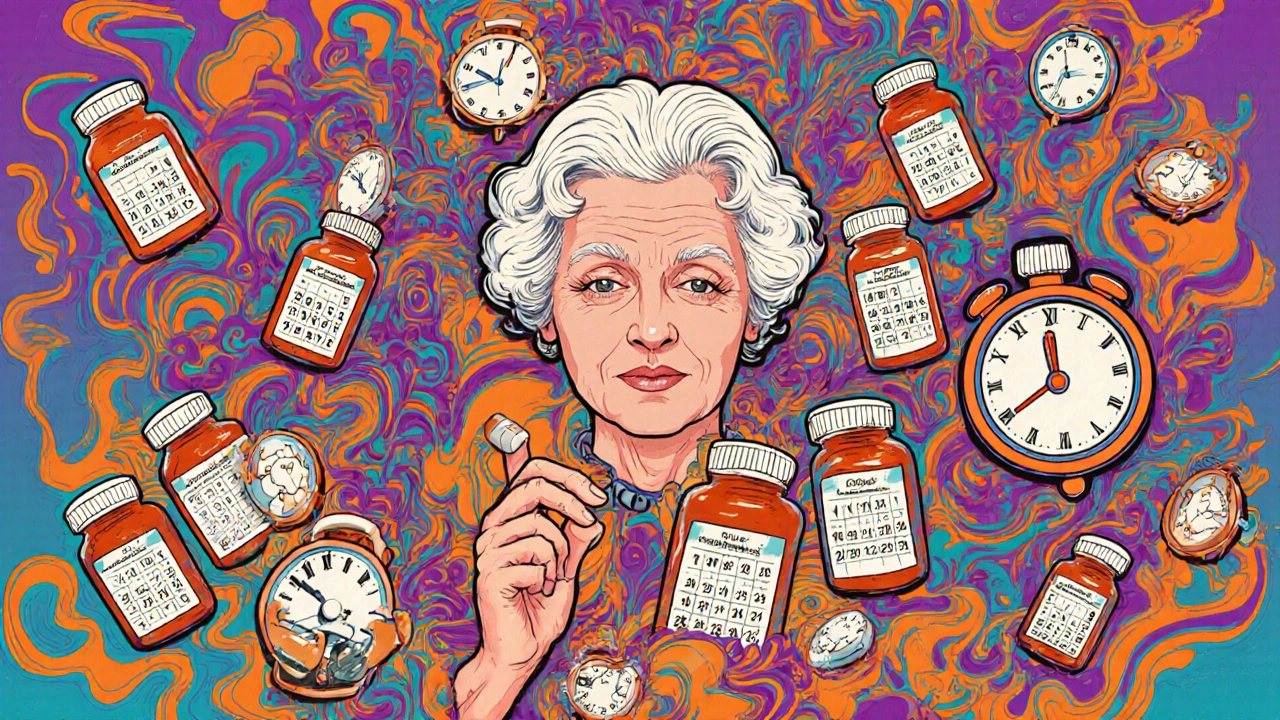How to Simplify Complex Medication Regimens for Older Adults

More than half of adults over 65 take five or more medications every day. Some take ten, fifteen, even twenty pills across morning, afternoon, evening, and bedtime. It’s not unusual for a senior to have a pill organizer with compartments for each day of the week - and still miss doses because the schedule is too confusing. This isn’t just inconvenient. It’s dangerous. Missed doses, wrong times, duplicate drugs - these lead to hospital visits, falls, and worsening health. The good news? You don’t have to live like this. Medication regimen simplification isn’t a luxury. It’s a necessity for independent living.
What Does Medication Simplification Actually Mean?
Simplifying a medication regimen doesn’t mean stopping drugs. It means making the schedule easier to follow - without losing the health benefits. Think of it like streamlining a messy kitchen: you don’t throw out the ingredients, you organize them so you can find what you need, when you need it.
There are three main ways this happens:
- Switching to once-daily doses - instead of taking a blood pressure pill three times a day, switching to a long-acting version that works for 24 hours.
- Using combination pills - replacing two separate pills (like a statin and a blood pressure pill) with one pill that contains both.
- Combining both - reducing the number of pills and the number of times you take them each day.
According to a 2020 study of 1,500 older adults in the U.S., 41% of medication regimens could be simplified just by reducing how often they had to be taken. Another study found that 56% of home care patients had regimens that could be made simpler - and when changes were made, self-reported adherence improved by nearly half.
Why Does This Matter So Much?
Complex regimens don’t just confuse seniors. They wear them down. Every time someone has to open a pill bottle, sort through a multi-compartment organizer, or remember whether they took their pill with food or on an empty stomach, it adds mental strain. For someone with memory issues, arthritis, or poor eyesight, it becomes overwhelming.
Studies show that when regimens are simplified, people actually take their meds as prescribed. That’s huge. But here’s the catch: better adherence doesn’t always mean better health outcomes. Taking your blood pressure pill at the right time won’t magically reverse heart disease. But it does prevent dangerous spikes, hospital stays, and complications that can knock someone out of their home and into a nursing facility.
One real example: an 82-year-old woman in Leeds was taking seven different pills - some twice a day, some with meals, some on an empty stomach. She started forgetting doses. Her blood pressure fluctuated. After a pharmacist reviewed her list, three pills were combined into one, two were switched to once-daily versions, and two were stopped entirely because they were no longer needed. Her daily pill count dropped from 14 doses to 5. Within two months, she reported feeling less stressed, sleeping better, and actually remembering her meds.
The Five-Step Process That Works
Simplification isn’t a quick fix. It’s a careful process. The MRS GRACE tool - developed in Australia and used across the UK and Europe - gives healthcare providers a clear five-step path:
- Get the full picture - Compile a complete list of every medication, including over-the-counter drugs, supplements, and herbal remedies. Many seniors don’t tell their doctor about aspirin or fish oil, but these can interact with prescriptions.
- Check what’s still needed - Not every drug prescribed years ago is still useful. Some are for conditions that have resolved. Others have safer, newer alternatives. This is called deprescribing - and it’s just as important as simplifying.
- Look for duplication - It’s common for multiple doctors to prescribe similar drugs. One for blood pressure, another for heart rhythm, both affecting the same system. These can often be merged or replaced.
- Find simpler alternatives - Can a pill be swapped for a patch? Can a twice-daily drug be changed to once-daily? Are combination pills available? This is where pharmacists make the biggest difference.
- Align with daily life - Can doses be timed to match meals, bedtime, or visits from family? A pill taken with breakfast is easier to remember than one taken at 7 a.m. on an empty stomach.
One UK pharmacist in Leeds reported that 80% of the patients she reviewed had at least one duplication or unnecessary medication. In one case, an elderly man was taking two different statins - prescribed by two different specialists. He didn’t know. Neither did his GP. Fixing that alone cut his daily pill count in half.

Which Medications Simplify Best?
Not all drugs respond the same way. Some are easier to combine or switch than others.
- Highly simplifiable: Blood pressure meds (especially ACE inhibitors and calcium channel blockers), cholesterol drugs (statins), and some antidepressants. Many now come in once-daily or combination forms.
- Tricky to simplify: Insulin (timing matters for blood sugar), thyroid medication (must be taken on empty stomach), and certain antibiotics. These often require strict timing, so simplification must be done carefully.
- Best for combination pills: Diabetes + blood pressure combos (like metformin + lisinopril), or heart failure meds (like sacubitril/valsartan). These are designed to reduce pill burden.
A 2020 review found that for antiretroviral drugs (used for HIV), combining doses improved adherence and health outcomes. But for diabetes and hypertension, simply reducing the number of pills didn’t always help - unless timing was also adjusted. The key takeaway? It’s not just about fewer pills. It’s about fewer moments of decision-making.
What Gets in the Way?
Even when simplification works, it’s not always done. Why?
- Time - A full medication review can take 45 to 60 minutes. Most GP appointments are 10 minutes.
- Training - Only 35% of pharmacy schools in the UK and US teach formal medication simplification techniques.
- Fragmented care - A senior might see a cardiologist, endocrinologist, neurologist, and GP - each prescribing without knowing what the others ordered.
- Resistance - Some patients believe more pills = better care. Others fear stopping anything, even if it’s outdated.
One aged care facility in Yorkshire reduced medication errors by 30% after implementing the MRS GRACE tool. But staff had to be trained. They had to block out time. They had to work with pharmacists. It wasn’t easy - but it was worth it.

What Families Can Do Right Now
You don’t need to be a doctor to help. Here’s what you can do:
- Make a list - Write down every pill, capsule, liquid, patch, or inhaler your loved one takes. Include dose, time, and reason (e.g., “Lisinopril 10mg - blood pressure”).
- Check expiration dates - Old pills in the back of the cabinet can be dangerous.
- Ask the pharmacist - Pharmacists are medication experts. Bring the list to them. Ask: “Can any of these be combined? Are any no longer needed?”
- Look for once-daily options - Ask if a brand-name drug has a generic, once-daily version.
- Use a pill dispenser with alarms - Not a substitute for simplification, but a helpful backup.
One daughter in Manchester noticed her mother was taking 12 pills a day. She brought the list to the pharmacist. Three were found to be duplicates. Two were stopped because they were no longer needed. Two others were switched to once-daily versions. Her mom went from 12 doses to 5 - and started taking them without help for the first time in years.
What’s Next for Medication Simplification?
Technology is catching up. Electronic health records now have tools that flag overly complex regimens. Epic Systems, a major health software provider, added a complexity scoring tool in 2022 that highlights opportunities for simplification. In Australia, the government now requires aged care homes to include simplification in their medication plans. The EU has made it a priority in its 2021-2025 action plan.
But progress depends on people asking for it. If your parent or grandparent is struggling with meds, don’t wait for a doctor to notice. Bring the list. Ask the questions. Push for a review.
The goal isn’t to cut corners. It’s to cut confusion. To give older adults back control - not just over their health, but over their daily lives. Fewer pills. Fewer reminders. Fewer mistakes. More confidence. More independence.
Can I just stop a medication if it seems unnecessary?
No. Never stop or change a medication without talking to a doctor or pharmacist. Some drugs need to be tapered slowly. Stopping abruptly can cause dangerous side effects like rebound high blood pressure, seizures, or withdrawal symptoms. Always get professional advice before making changes.
Are combination pills as effective as taking separate ones?
Yes, if they’re properly formulated. Combination pills contain the same active ingredients as the separate pills, just in one tablet. They’re tested to ensure the same absorption and effect. Many seniors find them easier to take, which leads to better adherence - and that’s often more important than the exact formulation.
What if my loved one needs to take a pill at a specific time, like before breakfast?
Some medications, like levothyroxine (for thyroid) or certain antibiotics, must be taken on an empty stomach. These can’t always be moved to a different time. In those cases, simplification focuses on reducing other pills in the regimen instead. The goal is to reduce overall burden, not eliminate all timing rules. Work with your pharmacist to find the best balance.
How do I know if a medication is no longer needed?
A pharmacist or geriatrician can review the list based on current health, lab results, and whether the original condition still exists. For example, a cholesterol drug prescribed after a heart attack might still be needed, but a bone density drug taken for five years might be stopped if scans show stable bones. Don’t assume - get it checked.
Is medication simplification covered by insurance?
In the UK, medication reviews are covered under NHS services like the Medicines Use Review (MUR) and New Medicine Service (NMS). These are free for patients and offered by community pharmacists. In the U.S., Medicare Advantage plans often cover comprehensive medication reviews. Ask your pharmacist what services are available locally.
Nosipho Mbambo
November 20, 2025 AT 04:10Katie Magnus
November 20, 2025 AT 06:27Bharat Alasandi
November 21, 2025 AT 08:02Kristi Bennardo
November 23, 2025 AT 07:09Shiv Karan Singh
November 24, 2025 AT 23:59Ravi boy
November 25, 2025 AT 01:09Matthew Karrs
November 26, 2025 AT 20:23Liam Strachan
November 28, 2025 AT 03:52Gerald Cheruiyot
November 29, 2025 AT 08:28